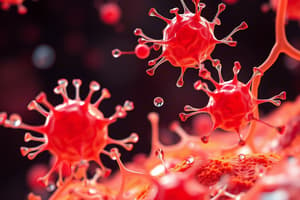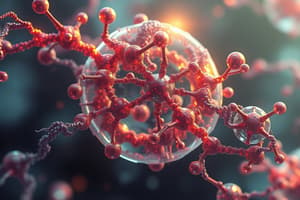Podcast
Questions and Answers
What is the primary function of lipids in biological systems?
What is the primary function of lipids in biological systems?
- Provide structural support
- Catalyze biochemical reactions
- Store energy and facilitate cell signaling (correct)
- Transport genetic information
Which statement accurately reflects the principles of cell theory?
Which statement accurately reflects the principles of cell theory?
- All organisms are unicellular.
- Cells can spontaneously form from non-living matter.
- All cells arise from pre-existing cells. (correct)
- The cell is the only living unit in an organism.
Which of the following is a principle of Mendelian inheritance?
Which of the following is a principle of Mendelian inheritance?
- Genetic information is acquired from the environment.
- Traits are inherited through a blend of parent characteristics.
- Alleles for a trait can be either dominant or recessive. (correct)
- All traits are passed on equally from both parents.
What is the main role of ATP in cells?
What is the main role of ATP in cells?
What distinguishes prokaryotic cells from eukaryotic cells?
What distinguishes prokaryotic cells from eukaryotic cells?
Which of the following best describes evolution?
Which of the following best describes evolution?
What is the relationship between an ecosystem and its biomes?
What is the relationship between an ecosystem and its biomes?
Which biomolecule is primarily responsible for supporting the structure of cells?
Which biomolecule is primarily responsible for supporting the structure of cells?
Flashcards are hidden until you start studying
Study Notes
Overview of Biology
- Definition: The study of living organisms, their structure, function, growth, evolution, distribution, and taxonomy.
- Branches:
- Botany: Study of plants.
- Zoology: Study of animals.
- Microbiology: Study of microorganisms.
- Genetics: Study of heredity and variation.
- Ecology: Study of interactions between organisms and their environment.
Basic Concepts in Biology
-
Cell Theory:
- All living organisms are made up of cells.
- The cell is the basic unit of life.
- All cells arise from pre-existing cells.
-
Homeostasis: The ability of an organism to maintain a stable internal environment despite changes in external conditions.
-
Evolution: The process through which species change over time through natural selection and genetic variation.
Biomolecules
- Carbohydrates: Provide energy and structural support (e.g., sugars and starches).
- Proteins: Made of amino acids, essential for structure, function, and regulation of the body’s tissues and organs.
- Lipids: Include fats, oils, and waxes; important for energy storage, cell membranes, and signaling.
- Nucleic Acids: DNA and RNA, responsible for genetic information and protein synthesis.
Cellular Biology
- Prokaryotic Cells: Simplistic, lack a nucleus (e.g., bacteria).
- Eukaryotic Cells: Complex, contain a nucleus and organelles (e.g., plant and animal cells).
Metabolism
- Anabolism: Process of building up larger molecules from smaller ones (requires energy).
- Catabolism: Process of breaking down larger molecules into smaller ones (releases energy).
- ATP (Adenosine Triphosphate): Primary energy carrier in cells.
Genetics
- DNA Structure: Double helix composed of nucleotides (adenine, thymine, cytosine, guanine).
- Heredity: Transmission of genetic information from parents to offspring.
- Mendelian Inheritance: Principles established by Gregor Mendel; includes concepts of dominant and recessive traits.
Ecology and Environment
- Ecosystem: A community of living organisms interacting with their environment.
- Biomes: Large regions characterized by specific climates and ecosystems (e.g., deserts, forests).
- Food Chains and Webs: Energy flow from producers to consumers to decomposers.
Human Biology
- Organ Systems: Groups of organs that work together (e.g., circulatory, respiratory, digestive).
- Homeostatic Mechanisms: Feedback systems regulating body temperature, pH, and nutrient levels.
Evolutionary Biology
- Natural Selection: Mechanism of evolution where traits promoting survival are passed on.
- Adaptation: Traits enabling organisms to thrive in specific environments.
Key Terms
- Biodiversity: Variety of life within an ecosystem.
- Symbiosis: Interaction between different species that live together.
This structured overview captures crucial aspects of biology relevant for study and understanding of living systems.
Biology: The Study of Life
- Biology is the study of life, encompassing all living organisms, their structures, functions, growth, evolution, distribution, and classifications.
Branches of Biology
- Botany: Focuses on plants.
- Zoology: Studies animals.
- Microbiology: Explores the world of microorganisms.
- Genetics: Investigates heredity and variations.
- Ecology: Examines the interactions between organisms and their environments.
Key Concepts in Biology
- Cell Theory: A foundational principle:
- All living things are composed of cells.
- Cells are the fundamental units of life.
- All cells originate from pre-existing cells.
- Homeostasis: Maintaining a stable internal environment, even with external changes.
- Evolution: The process of change in species over time through natural selection and the passing down of genetic variations.
Biomolecules: The Building Blocks of Life
- Carbohydrates: Provide energy and structure (examples: sugars and starches).
- Proteins: Essential for structure, function, and regulation; composed of amino acids.
- Lipids: Include fats, oils, and waxes; crucial for energy storage, cell membranes, and signaling.
- Nucleic Acids: DNA and RNA, responsible for genetic information and protein synthesis.
Cellular Biology: From Simple to Complex
- Prokaryotic Cells: Lack a nucleus, simpler structure (example: bacteria).
- Eukaryotic Cells: Possess a nucleus and organelles, more complex (examples: plant and animal cells).
Metabolism: The Energy of Life
- Anabolism: Building larger molecules from smaller ones, requiring energy input.
- Catabolism: Breaking down larger molecules into smaller ones, releasing energy.
- ATP (Adenosine Triphosphate): The primary energy carrier within cells.
Genetics: The Code of Life
- DNA Structure: A double helix made of nucleotides: adenine, thymine, cytosine, and guanine.
- Heredity: The passing of genetic information from parent to offspring.
- Mendelian Inheritance: Principles established by Gregor Mendel, including dominant and recessive traits.
Ecology and Environment: The Web of Life
- Ecosystem: A community of living organisms interacting within their environment.
- Biomes: Large geographical regions with specific climates and ecosystems (examples: deserts, forests).
- Food Chains and Webs: Illustrate the flow of energy from producers to consumers to decomposers.
Human Biology: Systems and Homeostasis
- Organ Systems: Groups of organs working together (examples: circulatory, respiratory, digestive).
- Homeostatic Mechanisms: Feedback systems regulating body temperature, pH levels, and nutrient levels.
Evolutionary Biology: The Story of Life
- Natural Selection: A mechanism of evolution where traits improving survival are passed on.
- Adaptation: Traits that enable organisms to flourish in specific environments.
Important Terms
- Biodiversity: The variety of life within an ecosystem.
- Symbiosis: Interactions between different species that live together.
Studying That Suits You
Use AI to generate personalized quizzes and flashcards to suit your learning preferences.




